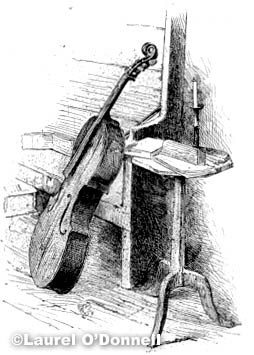The Little Brown House on The Albany Road
|
studies are with us in published works on astronomy, military science and colonial history by Hoyt, and on, mathematics, biblical criticism, civil law and general literature by Rodolphus Dickinson, one of his young friends.
Another boy of whom the world has heard received here his inspiration and here enjoyed his first laurels. Half a dozen rods from the great east window, Epaphras and Experience could see Mercy, sister of the General and wife of Justin Hitchcock, as she leaned from her pantry window for a morning chat, or busied herself about her back yard chores, her chickens and her geese. Among her two-legged cares was a bright, dark-eyed boy, the torment of her life, who early came under the influence of his "Uncle Ep." As a mere lad he would eagerly listen to the talk round his uncle's hearthstone, and as he grew in years his love for the truths of science kept pace with his hatred of the great usurper Napoleon; for all along he had drunk in the current talk which represented this master of the art of war as a blood-thirsty tyrant, a cruel monster, whose pastime was the murder of women and children. Picture the scene at the cottage on the evening of Monday, March 4, 1805, as the General read the latest news, that three months before, at Notre Dame, Bonaparte had been crowned emperor of France. Did hatred for the French nation prevent even pity for its fate? Did righteous indignation or dread despair for suffering humanity come uppermost in the minds of the assembled group? One year lacking a day, other news came, and to the hearers the tables seemed turned. With what joy they heard the General read from the Greenfield Gazette a highly colored account of the success of Alexander and the allied army over the French in a battle of December 2, 1805, and the comments — that "sanguine hopes are now entertained in Europe that Bonaparte has at length arrived at the termination of his career." This was the first report by the way of England of the battle of Austerlitz, a battle in which Napoleon gained one of his greatest victories over the combined armies of Russia and Austria. The fulfilment of these "sanguine hopes" was not yet. More countries were to be overrun, and more thrones to be overturned; thousands of widows and orphans were yet to taste the horrors of war. At length, however, Bonaparte's hour struck. June 3, 1814, a hand-bill was received at Deerfield, which was published in the Franklin Herald of June 7, containing the joyful news that the allied armies had entered Paris and that the emperor was a fugitive. We of this day can hardly imagine the excitement and the thanksgiving which followed this announcement; and of all the coterie of the little brown house, not one was more strongly impressed than the "bright, dark-eyed boy," Edward Hitchcock. He at once began his tragedy, "The Downfall of Bona?"  "Now Silently Resting In Memorial Hall."
These pages are © Laurel O'Donnell, 2006, all rights reserved
Copying these pages without written permission for the purpose of republishing in print or electronic format is strictly forbidden This page was last updated on 11 Feb 2006 |
